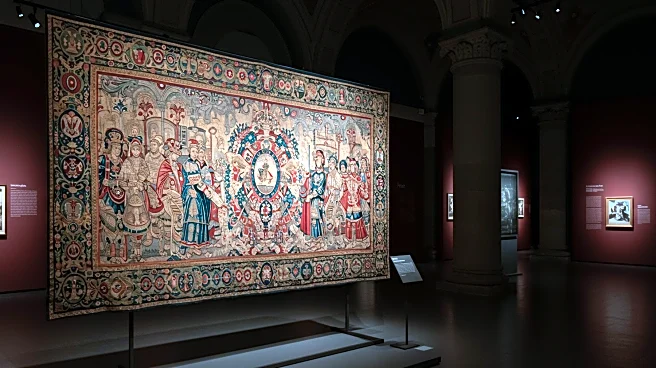What's Happening?
The French government has agreed to loan the Bayeux Tapestry to the United Kingdom for the first time in 950 years. This historic agreement was signed by British Prime Minister Keir Starmer and French President Emmanuel Macron in London. The tapestry, a 230-foot-long embroidery depicting the Norman Conquest of 1066, will be displayed at the British Museum in the fall of 2026. The decision has stirred controversy in France, with tens of thousands signing a petition urging President Macron to cancel the loan due to concerns over the tapestry's fragility. The tapestry, believed to have been commissioned by Bishop Odo, half-brother of William the Conqueror, is considered a significant cultural artifact and has been used historically as propaganda. The loan has reignited debates about cultural diplomacy and the preservation of historical artifacts.
Why It's Important?
The loan of the Bayeux Tapestry is significant as it represents a major cultural exchange between France and the UK, potentially strengthening diplomatic relations. It highlights the role of cultural artifacts in international diplomacy and raises questions about the preservation and transportation of fragile historical items. The tapestry's return to Britain, where it was likely made, is seen as a diplomatic victory for the UK. However, it also raises concerns about setting precedents for other cultural exchanges, such as the ongoing negotiations between the British Museum and Greek officials over the Parthenon Marbles. The decision underscores the complex interplay between cultural heritage and international politics.
What's Next?
The Bayeux Tapestry's loan to the UK is scheduled for the fall of 2026, coinciding with a major exhibition at the British Museum. The tapestry will undergo conservation efforts before its transport, addressing concerns about its fragility. The loan may influence future cultural exchanges and negotiations, particularly regarding the Parthenon Marbles. The Member of Parliament for Hastings has suggested that the tapestry should be displayed in Hastings, the site of the Battle of Hastings, rather than exclusively in London. This proposal could lead to further discussions about the exhibition's location and accessibility.
Beyond the Headlines
The loan of the Bayeux Tapestry highlights the ethical considerations of transporting and displaying fragile historical artifacts. It raises questions about the responsibilities of countries in preserving cultural heritage while engaging in diplomatic exchanges. The tapestry's depiction of the Norman Conquest continues to influence modern art and pop culture, demonstrating its enduring impact. The decision to loan the tapestry may also prompt discussions about the role of cultural diplomacy in international relations and the potential for cultural exchanges to foster mutual understanding and cooperation.










